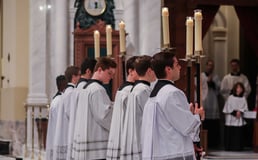Becoming Catholic
Interested in becoming Catholic or learning more about the Catholic faith? We would enjoy walking with you on your spiritual journey and invite you to consider joining others in the OCIA process.
The Order of Christian Initiation of Adults (formerly RCIA) is a gradual process, aimed at welcoming adults into our Catholic family through reflection on the experiences of their lives, the message of the Sacred Scripture, and the teachings and doctrines of the Catholic Church. It is a process with a focus on prayer, study, reflection, and discipleship.
To register for OCIA, or to be a Sponsor, click the “Register” tab above and fill out the appropriate registration form.
Questions? We encourage you to call Andrew Burson at (614) 882-2109 to learn more.
Unbaptized Children-Age of Reason
For children aged seven and older, who have not been baptized, we ask that they attend OCIA adapted for children. This program will run at the same time as OCIA on Sundays. These classes will be taught by PSR Catechists and will prepare your child to receive the Sacraments of Initiation at the Easter Vigil Mass. Below are some frequent questions and answers that will help you better understand the process.
These are children who were not baptized as infants. The Church has suggested that at age seven a child possesses the use of reason. However, discernment and discretion are needed to determine whether or not the child does show the ability to make rational decisions. Sometimes that can be prior to age seven. (See Canon Law #11 and RCIA #252-253)
Children age 6 and younger are normally baptized using the criteria and the Order of Baptism of Children.
Children who have reached catechetical age must enter into the Rite of Christian Initiation of Adults (adapted for Children). There is no such thing as RCIC (Rite of Christian Initiation of Children). Contained within the RCIA book is a chapter entitled “Christian Initiation of Children Who Have Reached Catechetical Age” (RCIA #252-330).
First, parents must give their permission for their child to receive the Sacraments of Initiation. Ideally, parents should be deeply involved in the initiation process and provide them with proper support.
If a child is in foster care or being raised by family members other than the biological parents, it is still important to check with the parents if possible and, if not, then the guardian may give consent, especially if a sense of permanence has been established. The primary caregiver needs to be deeply committed to nurturing the child’s faith life.
A “Sponsor” is an adult Catholic who accompanies the child along the way. It may be a parent or parents if appropriate. It also may be another adult from the parish. In situations where an entire family is coming into the Church, a Catholic family from the parish may serve as a sponsor family. Sponsors are present for liturgical rites and are able to witness to the child’s moral character, faith and intention as much as is age-appropriate.
A “Godparent” is present at the celebration of Baptism. Parents may not be godparents. The godparent provides guidance and support after baptism and throughout the child’s life.
The National Statutes on the Catechumenate #14 states, “In order to signify clearly the interrelation of the three sacraments which are required for full Christian initiation (Canon 842.2) adult candidates, including children of catechetical age, are to receive Baptism, Confirmation and Eucharist in a single Eucharistic celebration.”
Catching up with Catholic peers is not a sufficient reason to delay the Sacrament of Confirmation.
There will be a desire to participate in the life of the Church if the children have been formed with the intention of building a relationship with Jesus Christ instead of just memorizing doctrines and facts about the Church. It will be important to engage the entire family in parish life, especially through hospitality, ministry opportunities, and well-celebrated liturgies.
The uncatechized, unbaptized children have different needs than the already- catechized Catholic children. While on one hand, the children can benefit from building relationships with other children in the parish, it can also be intimidating for them. If the children do not already have knowledge of Jesus Christ and experience conversion, putting them in a formal religion class could be overwhelming and discouraging for them. It is important to find a balance where the children receive instruction that corresponds to their unique situation while incorporating them into the life of the parish.
Baptismal information is gathered and recorded. The children simply make a profession of faith either with the rest of their family or with parental consent. Following their reception into the Church they participate in the Parish Religious Education program and they receive the other initiation sacraments, Eucharist and Confirmation, with their peers. They are encouraged to celebrate the Sacrament of Reconciliation before their profession of faith is made.
How can parishioners help? Parishioners provide great support to those on the OCIA journey by nourishing them spiritually through prayer and physically with food. Please pray for the candidates/catechumens daily. If you would also like to bring them food, please reach out to [email protected] for the SignUp. Thank you!


